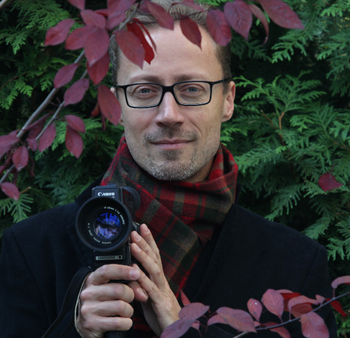
Rafael Lewandowski
Interviewing Holocaust survivors for the Shoah Foundation in the 1990s was a “second film school” for filmmaker Rafael Lewandowski, and an experience he still draws on today.
Lewandowski, who grew up in France and is the son of a Polish immigrant, was a student at the French film school La Femis when he first heard about the new Survivors of the Shoah Visual History Foundation from another student. He was just finishing a documentary, Cela, about a love story in a concentration camp in German-occupied Poland and was interested in Polish World War II history, so he agreed to be an interviewer.
“I wanted to meet and hear people who survived the Shoah, to understand this inexplicable tragedy,” Lewandowski said. “I also wanted to become a small part of a very essential and needed big project.”
Lewandowski conducted about 90 interviews and says he still remembers “faces, fragments of stories, reactions, accents and emotions,” especially from the most down-to-earth people who spoke simply and realistically about their ordeal.
Since then, Lewandowski has made several documentaries exploring the relationship between individual and collective memory, including A Shadowed Gaze, Hearings and Children of Solidarnosc. He has also made several films about the performing arts: In the Shadow of Don Giovanni, On the Other Side of the Canvas and The Art of Silence. He also directed short documentary programs for France 5 (Anne Andreu’s television program Absolument Cinéma) and ARTE (for the Faces of Europe series).
He directed his first feature film, The Mole, in 2011 and just finished a new documentary film Minkowski | Saga.
Today, Lewandowski says he considers his experience with the Shoah Foundation a “second film school.” When directing or writing a film or working with actors, he often draws on the ways the survivors expressed their emotions or spoke about intimate and extreme circumstances.
“I really learned how to listen to someone –it's not so easy, believe me – and how people deal with their emotions and their memories,” Lewandowski said.
The Shoah Foundation’s mission is important today because survivors are passing away and many people still deny the Holocaust, Lewandowski said.
What he has taken away most from working with the Shoah Foundation is the relationships he formed with each survivor and the impact he had as a mediator of their experiences in the Holocaust.
“I have the feeling that I gave them the unique opportunity to tell, for the first time in their life, their history to their children,” he said. “It's very moving. It still is even now after such a long time.”